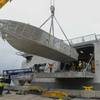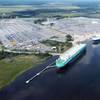Libyan Petroleum Facilities Guard (PFG) commander Ibrahim Jathran said on Monday he was ready to end a blockade at key oil terminals, but the U.N.-backed government still needs to sign an agreement for exports to resume.
The PFG has been demanding payment of workers' wages as part of any deal to end the blockade of Ras Lanuf, Es Sider and Zueitina. Details of the negotiations have not been made public.
A deal was thrown into doubt when the head of Libya's National Oil Corporation (NOC) in Tripoli, Mustafa Sanalla, wrote to the U.N. Libya envoy on Friday saying that it would set a "terrible precedent" to make payments to Jathran, who he blamed for the loss of some $100 billion in export revenue.
The NOC has expressed concerns that Jathran's demands have exceeded salary needs.
Sanalla said the NOC would not lift force majeure at export terminals if a payout went through due to the risk that the corporation would face liabilities over losses stemming from the blockade.
Jathran dismissed Sanalla's letter, saying it was "not worth the ink it was written with" and that it "neither advances nor delays" an agreement to resume exports between the PFG and the U.N.-backed government's Presidential Council.
The PFG was in the "highest state of readiness" to resume exports, he said. "The ball is now in the Presidential Council's court, it only has to come to Ras Lanuf to sign the agreement for exports to start."
The PFG was created as a national force to guard Libya's oil facilities. It is now internally divided, and Jathran's powerful unit, based in Libya's Oil Crescent region, has acted largely independently, switching political allegiances in recent years.
Jathran led blockades of the ports starting in 2013 saying he was trying to prevent corruption in oil sales, though others have disputed his motives.
The NOC is trying to revive Libya's oil production, crippled since the country slid into conflict following the uprising that toppled long-time leader Muammar Gaddafi five years ago.
Political quarrels, labour disputes, security threats have reduced output to less than a quarter of a 2011 high of 1.6 million barrels per day (bpd).
The NOC says that even if Jathran lifts his blockade, damage to the ports means exports would struggle to surpass 100,000 bpd in the near term, a fraction of their designed capacity.
Sanalla said in his letter that money would be better spent funding the NOC's largest subsidiary, Arabian Gulf Oil Company (Agoco). Agoco said on Monday that the eastern Sarir oil field, which normally produces about 100,000 bpd, remained closed as the company waited for funds to fix equipment and pay off debts.
(By Ayman al-Warfalli; Additional reporting by Libby George and Ahmad Ghaddar in London; Writing by Aidan Lewis, editing by William Hardy)










